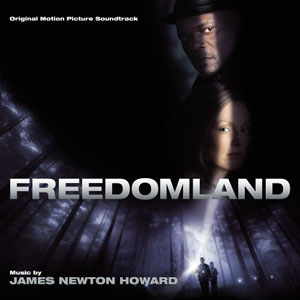Freedomland
Music composed by James Newton Howard
Performed by the Hollywood Studio Symphony
Orchestrated by Brad Dechter and Jeff Atmajian
Conducted by Pete Anthony
Produced by James Newton Howard and Jim Weidman
Available on Varese Sarabande (VSD 6717)
Running Time: 45:14
Amazon UK Amazon US

Directed by Joe Roth and starring Samuel Jackson and Julianne Moore, Freedomland is disguised as your average suspense thriller - which is confusing to say the least. After about a third of the film has passed you might find yourself wondering what it is you have missed, because the pieces of the puzzle don’t seem to be assembling themselves anymore. It’s as if the film has given itself up, and your patience is being tested.
But later on we start to comprehend that although the film is poorly narrated, it is in fact trying to tell us something important. The cinematographic details, sombre colouring, and musical choices by composer James Newton Howard all contribute to the delivery of this message, which is of an existential nature and universal in scope. Actually, in a number of ways it is very similar to Clint Eastwood’s tragic Mystic River from 2003.
James Newton Howard’s approach to writing this score seems to be quite similar to that of Eastwood and his Mystic River. Since both films are character driven and much of their soundtracks consumed by the spoken word, a simple melodic gesture is used repetitiously in order to establish contact with an audience. In Eastwood’s case, there are these three repeated notes, C, D, and B, that throughout the film unify the various characters and provoke emotional reflection among the audience. For Freedomland, Newton Howard has cleverly captured the emotional resonance of its characters with nothing more than a natural minor scale – first ascending, and then descending. Eight notes up, seven notes down. It couldn’t possibly be simpler! And there isn’t even a crescendo or decrescendo in the phrase, just even, detached semiquavers in the piano’s higher register. What a main theme! It works wonderfully.
The theme introduces itself towards the end of the main title, and is restated continuously through some of the film’s key scenes. One of these scenes is ‘Freedomland’, which accompanies a montage scene where hundreds of volunteer workers are searching for a missing four year old. This scene is the only place in the film where the music takes the foreground, and is the emotional climax of the soundtrack. It also features prominently in ‘Brenda’s Apartment’, where it finds contrapuntal consolation in the form of a lonely clarinet. And furthermore towards the end of the film in the cues ‘I’ll come see you’ and ‘Riot’, where it appears in a new rhythmic pattern.
Freedomland shows Newton Howard exploiting the instrumentation he knows best, in the genre that he probably does better than anyone else. We have a piano, strings, a synthesizer, a solo clarinet, an electric guitar, and percussion. He combines popular music elements such as electric guitar riffs and drum loops with widely spaced string orchestrations, clarinet solos, and electric drone basses. In a way he has become the innovator of the modern thriller score; his way to score this brand of Hollywood films has become the template which younger composers seem to have followed.
The dynamics of the score work amazingly well. The soft, tender moments featuring elegiac clarinet and piano parts dissolve unexpectedly into heavy guitar riffs and exciting percussion loops, with the piano and clarinet fading seamlessly into the background. It is a superb effort from Newton Howard, although not the ultimate concert experience – which is a given in this type of film. It is music that is meditative more than anything else, thoughtful, and that wishes to uncover the deep ends of the human condition with as few notes as possible.
Mark Rayen Candasamy
Rating:
4
Return to Reviews Index